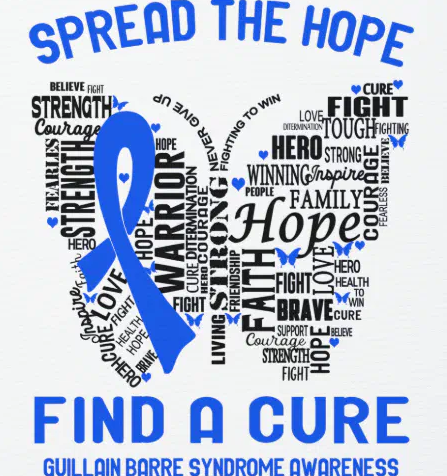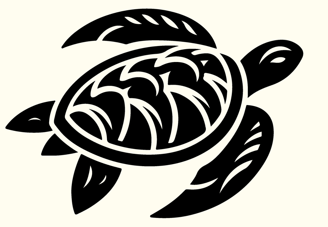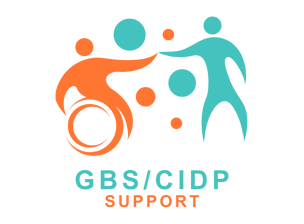What is Guillain-Barré Syndrome (GBS)?
Guillain-Barré (Ghee-yan Bah-ray) Syndrome is an inflammatory disorder of the peripheral nerves outside the brain and spinal cord.
It’s also called:
Acute Inflammatory Demyelinating Polyneuropathy
Landry’s Ascending Paralysis
GBS is characterised by the rapid onset of numbness, weakness, and often
paralysis of the legs, arms, breathing muscles, and face.
Paralysis is ascending, meaning that it travels up the limbs from fingers and toes towards the torso. Loss of reflexes, such as the knee jerk, are usually found.
What causes GBS?
The cause is unknown. We do know that about 50% of cases occur shortly after a microbial infection (viral or bacterial), some as simple and common as the flu or food poisoning. Some theories suggest an autoimmune trigger, in which the patient’s defence system of antibodies and white blood cells are called into action against the body, damaging myelin (nerve covering or insulation), leading to numbness and weakness.
How is GBS diagnosed?
To confirm a diagnosis, two tests may be performed:
A lumbar puncture looking for elevated fluid protein
Electrical test of nerve and muscle function.


How is GBS treated?
GBS in its early stages is unpredictable, so except in very mild cases, most newly diagnosed patients are hospitalised. Usually, a new case of GBS is admitted to ICU (Intensive Care Unit) to monitor breathing and other body functions until the disease is stabilised.
Plasmapheresis (or plasma exchange) and high dose intravenous immunoglobulins (IVIg) are often helpful to shorten the course of GBS.
The acute phase of GBS typically varies in length from a few days to months, with over 90% of patients moving into the rehabilitative phase within four weeks.
Patient care involves the coordinated efforts of a team such as a neurologist, rehabilitation physical therapist, general practitioner, physiotherapist, occupational therapist, social worker, nurse, and psychologist or psychiatrist. Some patients require a speech therapist if speech (and swallowing) muscles have been affected.
Living with GBS
Recovery may occur over six months to two years or longer. A particularly frustrating consequence of GBS is long-term recurrences of fatigue and/or exhaustion as well as abnormal sensations including pain and muscle aches. These can be aggravated by “normal” activity and can usually be alleviated by pacing activity and rest.


New Survey Offers Detailed View of Short- and Long-Term Burden of Guillain-Barré Syndrome
CONSHOHOCKEN, Pa., Feb. 28, 2025 /PRNewswire/ -- The GBS | CIDP Foundation International today released new survey data illustrating how people with Guillain-Barré Syndrome experience this life-threatening neurological condition.
The report surveys people who have had or are recovering from GBS - a neurological disorder that causes numbness, weakness, and often paralysis of the limbs, face, and muscles used to breathe -- about their experiences before, during, and after diagnosis.
Key findings from the survey include:
Acute care
One in three GBS patients needs to be placed on a ventilator.
Nearly two-thirds of GBS patients end up in the intensive care unit.
Recovery
Two in three GBS patients will need to undergo rehab.
Almost 90% struggle to finish tasks due to fatigue.
Roughly three-quarters say pain interferes with their day-to-day activities.
Forty-five percent require medical devices, like wheelchairs or walkers, after treatment.
Financial, social, and mental health effects
Four in ten GBS patients experience changes in their employment.
Nearly one-fifth face annual out-of-pocket costs of over $5,000.
Six in ten report feeling "helpless" as a result of their GBS.
View original content to download multimedia: https://www.prnewswire.com/news-releases/new-survey-offers-detailed-view-of-short--and-long-term-burden-of-guillain-barre-syndrome-302388181.html
SOURCE The GBS | CIDP Foundation International


To view the European Academy of Neurology/Peripheral Nerve Society Guideline on diagnosis and treatment of Guillain–Barré syndrome
please click here.


Supporting Australians with GBS, CIDP, MMN and related conditions.
© GBS CIDP Support 2025. All rights reserved.
ABN 99 400 279 454


242 Elsworth Street West,
Mount Pleasant VIC 3350
0484 293 889
0412 180 971



GBS CIDP Support is a Registered Charity with the Australian Charities and Not-for-profits Commission (ACNC) and is endorsed as a Deductible Gift Recipient. All donations of $2 or more towards our cause are Tax Deductible.

